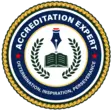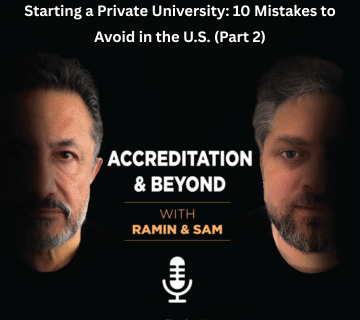Approval through Accreditation: Simplifying the Process for Educational Institutions
Operating an educational institution comes with various regulatory requirements to ensure compliance with state standards and quality assurance. For institutions accredited by a recognized agency by the United States Department of Education, obtaining approval from the Bureau for Private Postsecondary Education (BPPE) can be streamlined through the “Approval through Accreditation” option.

1. The Advantage of Accreditation:
Institutions with accreditation from recognized agencies have the opportunity to seek BPPE approval by means of their existing accreditation. This option provides a more efficient pathway for demonstrating compliance with state standards, saving time and resources.
2. The Application Process:
To obtain approval by means of accreditation, institutions must submit the “Application for Approval to Operate an Accredited Institution.” Compared to the standard approval procedure, this streamlined process applies specifically to the institutional locations, program offerings, and approval dates covered by the existing accreditation.

3. Matching Standards:
For approval through accreditation, it is essential that all main, branch, and satellite locations of the institution have the same term of accreditation, offer the same programs, and share the same ownership structure. This ensures consistency across all locations.
4. Limitations of the Process:
Institutions seeking BPPE approval to offer unaccredited programs or operate locations without accreditation cannot use the approval through the accreditation process. In such cases, they must follow the traditional Application for Approval to Operate for an Institution Non-Accredited.
5. Renovation and Renewal:
Institutions with existing accreditation but no prior approval by means of accreditation can still apply for renewal as an accredited institution. By submitting an “Application for Approval to Operate an Accredited Institution,” they can seamlessly proceed with the renewal process.
6. Understanding the Regulatory Framework:
Educational institutions and stakeholders are encouraged to review the California Private Postsecondary Education Act of 2009 (CEC) and the California Code of Regulations (CCR) for comprehensive information regarding approval processes and compliance standards.

7. Frequently Asked Questions:
To address common inquiries, the BPPE provides a list of frequently asked questions (FAQs) covering various aspects of the approval process, eligibility criteria, and other essential details.
8. Accreditation Types and Eligibility:
It is essential to note that not all types of institutional accreditation qualify for approval by means of the accreditation process. Institutions can only utilize this option if they hold accreditation from a recognized agency that accredits the institution.
9. Required Documentation:
To apply for approval by means of accreditation, institutions need to submit a complete Application for Approval to Operate an Accredited Institution, along with a certified copy of the current accreditation verification, required fees, and evidence of any necessary approvals from other government agencies.
10. Compliance and Institutional Growth:
By understanding the approval through the accreditation process, educational institutions can ensure compliance with state regulations while promoting seamless growth and expansion. Consulting with BPPE experts can provide valuable guidance throughout the approval journey, facilitating smooth and successful operations.
Are you facing challenges with state authorization, accreditation, or obtaining approval for your educational institution? Do not worry; we’ve got you covered! Our experienced team at Accreditation Expert Consulting (AEC) is here to provide the expertise and support you need. Whether you are navigating the complexities of the Bureau of Postsecondary Education (BPPE) approval process or seeking guidance on compliance with new regulations, we are just a phone call away. Let us help you lay a strong foundation for your institution’s success and ensure educational excellence.
Contact us today, and let us work together to achieve your goals!
Frequently Asked Questions about Approval by Means of Accreditation Navigating the world of educational institution approvals can be complex, especially regarding accreditation and compliance. To shed light on common queries, we have compiled a list of frequently asked questions regarding the Bureau for Private Postsecondary Education’s (BPPE) “Approval by Means of Accreditation” process.
1. Does the Bureau accredit institutions?
No, the BPPE does not accredit institutions. Instead, it approves individuals to operate educational institutions in California. Approval signifies compliance with state standards outlined in the Private Postsecondary Education Act. Accreditation, on the other hand, is a voluntary, non-governmental review process conducted by accrediting agencies.
2. Must a person operating an accredited institution obtain approval from the Bureau?
In most cases, yes. Unless an institution is exempt from BPPE oversight under CEC §94874 or §94874.1, it must obtain approval to operate in California.
3. Can an accredited institution choose between non-accredited and accredited application processes for approval?
An accredited institution can apply through either the non-accredited or accredited application process. The choice ultimately lies with the institution.
4. Which types of institutional accreditation qualify for approval by means of accreditation?
Not all types of institutional accreditation qualify for this process. Institutions can only use the approval by means of accreditation option if they hold accreditation from a recognized accreditation agency that accredits the entire institution (CEC §94813, §94890).

5. What documentation is required for approval by means of accreditation?
To apply for approval by means of accreditation, institutions need to submit the “Application for Approval to Operate an Accredited Institution,” along with a certified copy of the current accreditation verification, required fees, and evidence of any necessary approvals from other government agencies (CEC §94892).
6. What does “certified copy of a current verification of accreditation” mean?
A certified copy of accreditation verification confirms that the information submitted in the application is complete and consistent, providing sufficient details about the institution’s accreditation, term of accreditation, and accredited programs. The accrediting agency must supply this information.
7. Can an institution with approval through accreditation offer unaccredited programs?
No. Institutions seeking to offer unaccredited programs must apply for institutional approval through the non-accredited application process. An exception exists when an accredited institution obtains approval from another government agency for a specific program, and the accrediting agency does not require or provide approval for that program (CEC §94892).

8. Will the Bureau approve changes before the accrediting agency does for institutions with approval by means of accreditation?
No. All changes must be authorized by the accrediting agency first (CEC §94896). Only after receiving the accrediting agency’s approval or written confirmation can the licensee notify the Bureau in writing within 30 days. This ensures proper coordination between the two bodies.
Understanding the approval by means of the accreditation process is crucial for educational institutions operating in California. Institutions can navigate the BPPE’s regulatory landscape with confidence and compliance by seeking clarity through these frequently asked questions.
Contact Us, We Can Help You! Info@accreditationxpert.com




